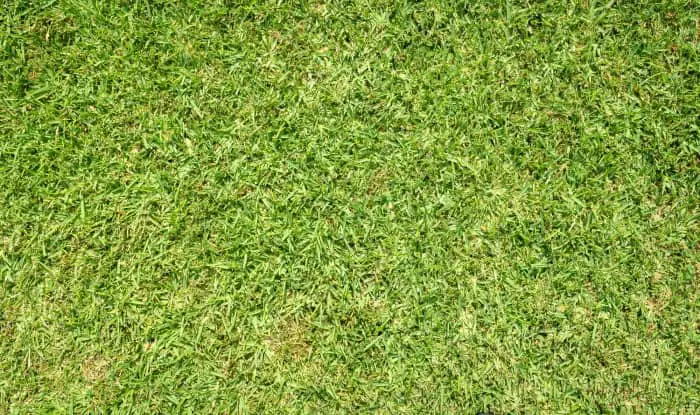St. Augustine is one of the most popular grasses used on southern lawns.
But taking care of it can be difficult because many herbicides cause it damage.
Fortunately, there are products that are specially formulated to fight weeds on this sensitive grass type.
My recommended choice is Southern Ag Atrazine St. Augustine Grass Weed Killer.
This powerful weed killer is effective on a wide range of common lawn weeds. And it also offers pre-emergent control, preventing weed seeds from germinating in the treated area.
The best weed killer for St. Augustine grass at a glance:
- Southern Ag Atrazine St. Augustine Grass Weed Killer – Best Overall
- Image Kills Nutsedge Concentrate – Best For Nutsedge
- The Andersons Barricade Professional-Grade – Best Pre-emergent
- Scotts Turf Builder Southern Triple Action – Best Weed & Feed
All links lead to Amazon, where you can find more information & customer reviews.
The Best Weed Killer For St. Augustine Grass: Reviews
Southern Ag Atrazine St. Augustine Grass Weed Killer
This weed killer from Southern Ag is specially designed for safe use on St. Augustine grass. It gives you both pre-emergent and post-emergent control of a wide range of broadleaf weeds. As well as many grassy weeds, including crabgrass, Poa annua, and barnyardgrass.
It contains the active ingredient atrazine. This kills weeds that are already growing. And when applied in early spring and late fall it stops weed seeds from germinating.
But you have to be careful using it around trees, ornamental shrubs, and flowers. So avoid applying it over the root zone because it can cause harm.
You need some patience when using it, as it sometimes takes a few weeks or more for the full results to show.
Image Kills Nutsedge Concentrate
This product is specially formulated for killing nutsedge in southern lawns.
It contains the broad-spectrum herbicide imazaquin. Not only does this provide good control of purple and yellow nutsedge, but it also kills grassy weeds such as Poa annua, wild onion, wild garlic, and dollarweed. As well as many broadleaf weeds.
Because it controls grasses, there are only a small handful of lawn grasses that it’s good to use it on.
It won’t harm the following established turfgrass:
- St. Augustine grass
- Zoysiagrass
- Buffalograss
- Centipedegrass
- Bermudagrass
It’s advised to apply this product after the spring green up. Usually, you’ll see results quickly. But be prepared for the fact that it sometimes takes a few weeks to kill nutsedge.
The Andersons Barricade Professional-Grade Granular Pre-Emergent Weed Control
This product is a professional-grade pre-emergent herbicide.
It comes in granules containing the active ingredient prodiamine. When used at the right time of year, it prevents weed seeds from germinating in the ground.
But. if you need to get rid of weeds that are already growing you’ll need another product. This only prevents them from growing in the first place. But this is often the most effective way of keeping your lawn free from weeds.
It’s easy to apply using a broadcast spreader. After which, you water your lawn so the prodiamine can soak into the soil.
Most common grassy and broadleaf weeds are taken care of, including henbit, Poa annua, crabgrass, purslane, dandelion, oxalis, carpetweed, goosegrass, and chickweed.
Not only does it not harm your grass, but it also won’t cause any damage to other desirable plants. So it’s safe to use around shrubs, landscape ornamentals, and in your flower beds.
The product comes in an 18 lbs bag that covers 5,800 sq. ft.
Scotts Turf Builder Southern Triple Action
This weed and feed not only kills weeds and provides fertilizer for your lawn, but it also acts as an insecticide. The insects it controls include mole crickets, fire ants, fleas, armyworms, and sod webworms.
The weeds and insects aren’t completely killed straight away. You can expect to wait a few weeks for the full results. And occasionally you might need to apply it a second time for particularly stubborn weeds. But it gives you good control of common broadleaf weeds such as plantain, dollarweed, chickweed, and clover.
The fertilizer included in the formula has an NPK ratio of 29-0-10 (Nitrogen, Phosphorus, Potassium) that will help your grass grow thicker and stronger. This provides one of the best defenses against weeds as they find it easier to become established on thin and patchy lawns.
Designed for use on southern lawns, it comes recommended for these lawn grasses:
- St. Augustine grass (including Floratam)
- Centipedegrass
- Zoysiagrass
- Carpetgrass
The product comes in granules that need to be watered into the ground after application.
2 different sized bags are available, covering 8,000 sq. ft. and 4,000 sq. ft.
Roundup for Lawns Ready to Spray
RoundUp is a brand that’s well-known for its non-selective weed killers. It will kill most common types of lawn weeds. But unfortunately, the standard RoundUp products will also kill your grass.
But this is a specially formulated selective weed killer that’s good to use on southern lawns.
You can use it on:
- St. Augustine grass (including Floratam)
- Zoysiagrass
- Centipedegrass
- Bahiagrass
- Bermudagrass
It’s best to use it when the temperature outside is less than 85°F. So be careful when using it in the hot summer months.
It comes as a ready-to-spray weed killer that you connect to your garden hose for easy broadcast application across your lawn.
It’s a systemic weed killer that kills weeds to the roots to prevent them from regrowing. And you can use it to control 90+ common lawn weeds. Including yellow nutsedge, clover, dollarweed, and dandelion.
After you spray it you can expect to see results within 10-14 days. But multiple applications are sometimes needed in heavily infested areas. And it’s recommended to use it when weeds are still young and in their early stages of growth for the best results.
The 32 fluid ounce bottle contains enough to treat 6,000 sq. ft. And Roundup offers a money-back guarantee if the product doesn’t meet your expectations.
Spectracide Weed Stop For Lawns For St. Augustine & Centipede Concentrate
This version of Spectracide’s popular Weed Stop For Lawns is specially formulated to be safe for use on St. Augustine grass and centipede grass.
The main active ingredient is atrazine. Which gives it the ability to work as a post-emergent and pre-emergent herbicide. So it will kill a wide range of weeds that are already established in your lawn. And it prevents weed seeds from germinating when sprayed at the right times of year.
Make sure to use it when temperatures are below 90°F to avoid damaging your grass.
It takes a couple of weeks to see the results. But it does sometimes need multiple applications.
The ready-to-spray bottle is easy to connect for broadcast spraying with its hose-end sprayer attachment. And it contains enough concentrate to cover 3,720 sq. ft. of lawn.
Ortho Weed B Gon Weed Killer for St. Augustinegrass
Unlike other versions of Ortho’s popular Weed B Gon line of weed killers, this one is specially formulated to be safe for St. Augustine grass, including the floratam variety.
The main active ingredients are dicamba, mecoprop-p, and 2,4-D. These post-emergent and systemic herbicides provide control of over 250 common species of lawn weeds.
The bottle is simple to attach to your garden hose for quick and easy dilution of the concentrate as you spray.
It’s rainproof 1 hour after application. Which makes it easy to use even on days when the weather is unpredictable.
How To Choose The Best Weed Killer For St. Augustine Grass
Once you’ve found a weed killer that’s safe to use on St. Augustine grass there are some other important things to consider.
Weed killers come in different types and are designed for different uses. And the weed situation in your lawn will determine the type of herbicide you need.
Pre-emergent
Pre-emergent herbicides work by preventing weeds from growing. They do this by stopping the weed seeds from germinating.
You need to apply them to the soil at the right time of year. This varies depending on the weed species, but it’s usually in early spring and late fall.
If you know the type of weeds you’re struggling with then you can find out more precisely the best time to apply the herbicide.
If you apply a pre-emergent too late then it won’t work and the weeds will grow in your lawn. But once in the soil, they usually continue to have an effect for around 6-12 weeks depending on the product. Sometimes, a second application is required after this time to give you season-long control.
Pre-emergent herbicides are often the best choice for controlling annual weeds that leave a lot of seeds in the ground waiting for the next growing season, such as crabgrass and Poa annua.
You can get pre-emergent herbicides as liquids or granules. After applying granules to your lawn, it’s important to water them into the soil so they can start to have an effect.
Post-emergent
Post-emergent herbicides are the type that kill weeds that are already established and growing in your lawn.
This is the most common type of weed killer available on the market. And some products combine more than one type of post-emergent herbicide into one formula so it can control the largest range of weeds.
Weed killers for lawn care usually contain systemic herbicides that are absorbed by the plant. Once inside they are translocated around the circulatory system and affect all areas of the plant including the roots. By completely killing the weed from the inside they prevent it from regrowing.
St. Augustine grass can be harmed by many common herbicides used in weed killers, so it’s important to get a product that’s labeled as safe to use on this grass. Products containing atrazine and imazaquin are often recommended for killing weeds that are growing in St. Augustine grass.
Conclusion
What is the best grass and weed killer for St. Augustine grass?
My top choice is Southern Ag Atrazine St. Augustine Grass Weed Killer.
It’s a powerful and effective herbicide that’s safe to use. And it offers post-emergent and pre-emergent control of a wide variety of common weeds.

















Can you recommend a weed killer & fertilizer that is ORGANIC for St. Augustine lawns?
Thank you.
Hi Ellen,
You can get organic fertilizer to use on your lawn, but organic weed killer (horticultural vinegar, citric acid, citrus oil, clove oil, eugenol, etc) is non-selective so it will also harm your grass. If you spot treat carefully then you can minimize the grass damage and it will usually recover. But organic weed killers won’t kill the root system of perennial weeds or the rhizomes, tubers, and bulbs, so the weeds will often grow back.